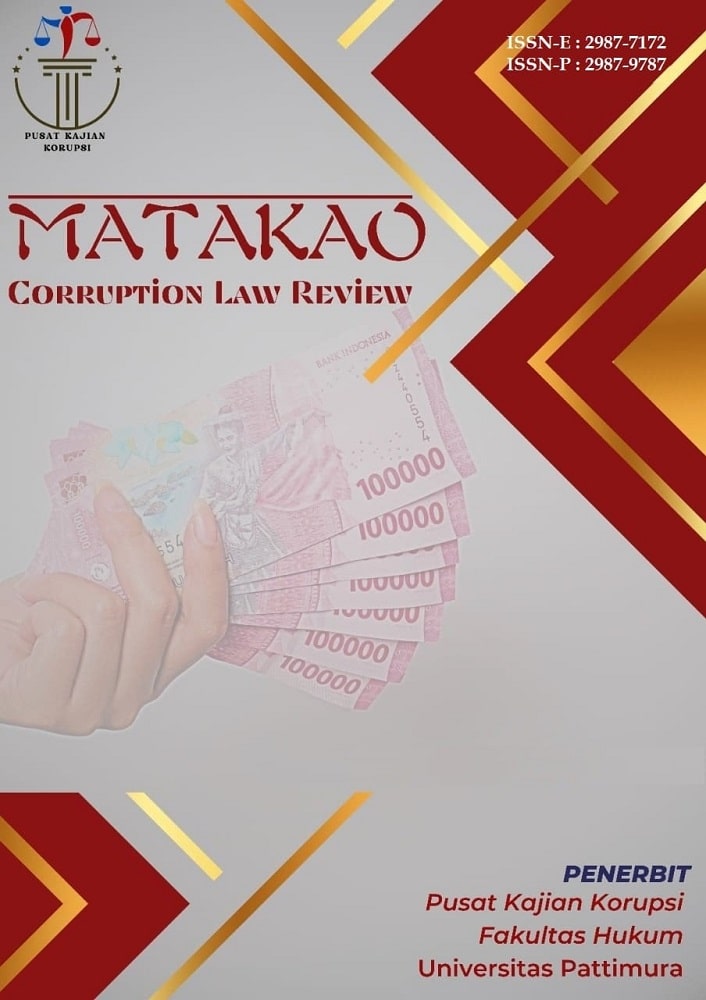Pengaturan Tindak Pidana Korupsi Dalam Undang-Undang Nomor 1 Tahun 2023 Tentang Kitab Undang-Undang Hukum Pidana Serta Pengaruhnya Terhadap Kepastian Hukum
Abstract
Introduction: Corruption, which already has a specific law, has become ambiguous after the enactment of Law 1/2023. Five articles were revoked and formulated in the Criminal Code as general criminal law, several articles experienced reduced sanctions. This shows that the political direction of eradicating corruption is increasingly unclear, both in terms of sanctions and the existence of corruption regulations.
Purposes of the Research: This study aims to determine the basis for formulating the regulation of criminal acts of corruption in the New Criminal Code and to determine the legal certainty of the rules on criminal acts of corruption after being formulated into the New Criminal Code based on the principle of lex specialis derogat legi generali.
Methods of the Research: The research method used in this writing is normative legal research. Normative legal research is research that prioritizes the discussion of legal theory and legal norms that exist in the legal system.
Results of the Research: The formation of the New Criminal Code aims to recodify and reunify in one comprehensive law, by including the main criminal acts outside the Criminal Code. However, there is ambiguity because the government not only reformulated, but revoked five articles and reduced the sanctions. The author concludes that it should not be revoked or the sanctions reduced, because it can cause legal uncertainty and is contrary to the principles of law. This step is considered a setback in eradicating corruption which is an extraordinary crime. Therefore, what should be done is an update to the Corruption Law.
Downloads
References
Barda Nawawi Arief, Kebijakan Hukum Pidana Perkembangan Penyusunan Konsep KUHP Baru, Jakarta: Kencana, 2017.
Dwi Nur Fatimah, Pengantar Ilmu Hukum di Indonesia, Kota Metro: Nafal Publishing, Kota Metro, 2024.
Erizka Permatasari, “Penjelasan Asas Lex Superior Derogat Legi Inferiori Bedanya dengan Lex Specialis”, https://www.hukumonline.com/klinik/a/penjelasan-asas-ilex-superior-derogat-legi-inferiori-i-dan-bedanya-dengan-ilex-specialis-i-lt51375eaee3c7d/.
KompasTV. (2018, 6 Juni). RKUHP Akan Lemahkan KPK?. [Video]. YouTube. https://www.youtube.com/watch?v=S7Z_9_7qT4Y&t=100s.
Ridel Filbert dan Tomi Sondakh, “Praktek Penegakan Hukum Yang Terkait Dengan Ujaran Kebencian Di Indonesia”, E-Journal UNSRAT, Universitas Sam Ratulangi, Vol. XI, No. 3, 2023, 1, https://ejournal.unsrat.ac.id/v3/index.php/lexprivatum/article/view/47306/42102.
Ridwan, Kebijakan Formulasi Tindak Pidana Korupsi, Serang: Untirta Press, 2020.
Ridwan, “Kebijakan Formulasi Hukum Pidana dalam Penanggulangan Tindak Pidana Korupsi,” Law Reform 8, no. 1 (2016): 80, https://ejournal.undip.ac.id/index.php/lawreform/article/view/12418.
Rofiq Hidayat, “4 Catatan ICW Terhadap Korupsi dalam KUHP Baru”, https://www.hukumonline.com/berita/a/4-catatan-icw-terhadap-pasal-korupsi-dalam-kuhp-baru-lt639c1f8a49404/.
Shinta Agustina, “Implementasi Asas Lex Specialis Derogat Legi Generali Dalam Sistem Peradilan Pidana,” Jurnal Masalah-Masalah Hukum 44, no. 4 (2015): 504, http://journal.upy.ac.id/index.php/pkn/article/view/3244.
Copyright (c) 2025 Nelly Esterina Situmorang, Aan Asphianto, Ridwan Ridwan (Author)

This work is licensed under a Creative Commons Attribution-NonCommercial 4.0 International License.
Copyright:
Authors who publish their manuscripts in this Journal agree to the following conditions:
- The copyright in each article belongs to the author, as well as the right to patent.
- Authors are able to enter into separate, additional contractual arrangements for the non-exclusive distribution of the journal's published version of the work (e.g., post it to an institutional repository or publish it in a book), with an acknowledgment of its initial publication in this journal.
- Authors are permitted and encouraged to post their work online (e.g., in institutional repositories or on their website) prior to and during the submission process, as it can lead to productive exchanges, as well as earlier and greater citation of published work.
- Authors have the right to self-archiving of the article (Author Self-Archiving Policy)
Licence : This Journal is disseminated based on the Creative Commons Attribution-NonCommercial 4.0 International license terms. This license allows anyone to copy and redistribute this material in any form or format, compose, modify, and make derivatives of this material for any purpose. You cannot use this material for commercial purposes. You must specify an appropriate name, include a link to the license, and certify that any changes have been made. You can do this in a way that is appropriate, but does not imply that the licensor supports you or your use.

This work is licensed under a Creative Commons Attribution-NonCommercial 4.0 International License..












